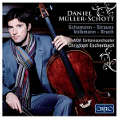ORFEO International – Reviews
Important Releases Briefly Introduced
October 2009
ORFEO 1 CD C 781 091 A
Daniel Müller-Schott: Schumann - Strauss - Volkmann - Bruch
On his latest CD, Daniel Müller-Schott devotes himself to the cello’s Romantic and late-Romantic solo concerto repertoire. It is a voyage of exploration that offers things both known and worthy of (re)discovery. 
Daniel Müller-Schott
Foto: Christine SchneiderAfter the Classical period, the cello fell out of fashion as a concertante instrument. When that changed again in the mid-19th century, it fascinated composers more than ever, and this in turn had an impact on their creative muse. For Robert Schumann, to be sure, the composition of his Cello Concerto in A minor op. 129 was bound up with major disappointments – he himself did not live to hear its world première. But the concerto’s give and take between soloist and orchestra is exciting, as are its contrasts between discretion and impulsiveness, and it is today well-loved by both audiences and interpreters and a firm feature in the repertoire. The interpretation of the concerto here by Daniel Müller-Schott and the NDR Symphony Orchestra of Hamburg under Christoph Eschenbach is characterized by untrammelled music-making and a homogenous ensemble. Eschenbach’s rich experience as an instrumentalist and in the world of opera is evident in the way his phrasing „breathes“ with the soloist. 
C 781 091 AThe dramatic aspect of the music comes as much to the fore here as it does in our recording of the Cello Concerto in A Minor by Schumann’s contemporary Robert Volkmann. It is considerably less popular than Schumann’s, but it thrives on singing, melodic themes and their sophisticated elaboration. These two concertos are complemented by two shorter pieces: Max Bruch’s Kol Nidrei op. 47 after Old Hebrew melodies, whose rich musical spectrum is savoured uninhibitedly and to the full by Daniel Müller-Schott, Christoph Eschenbach and the NDR Symphony Orchestra. Then there is the Romance in F Major for cello and orchestra by Richard Strauss, who despite his youth (he wrote it when 19) already offers us a hint of the originality of his later tone poems.
For more details, fotos and audio examples see also "www.daniel-plays-schumann.com".
top |